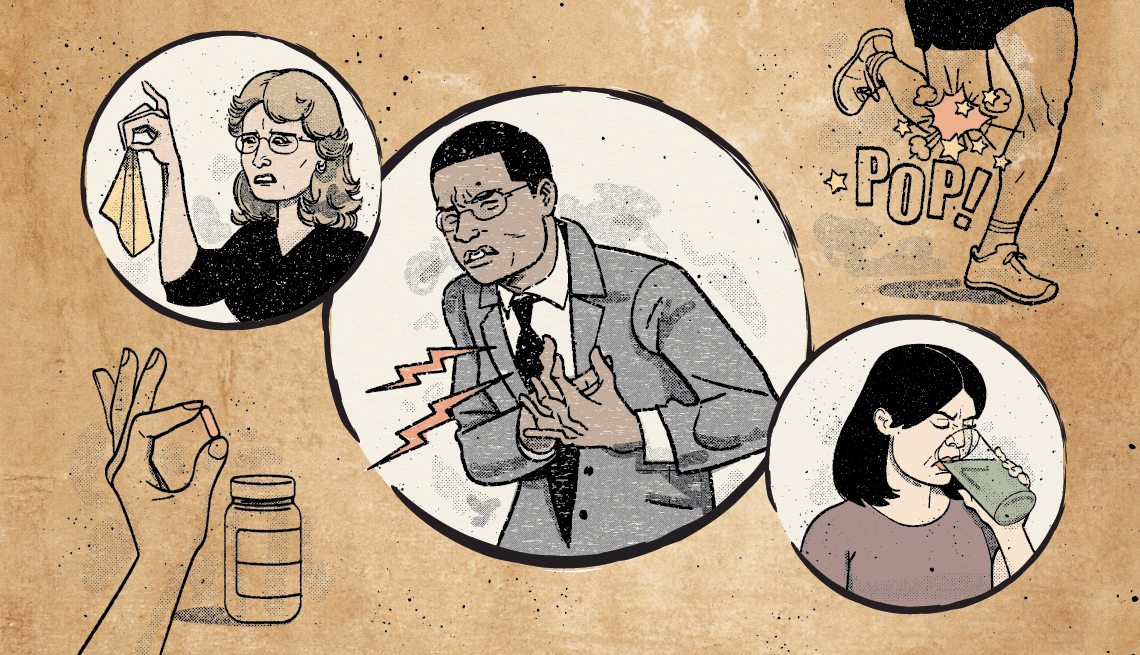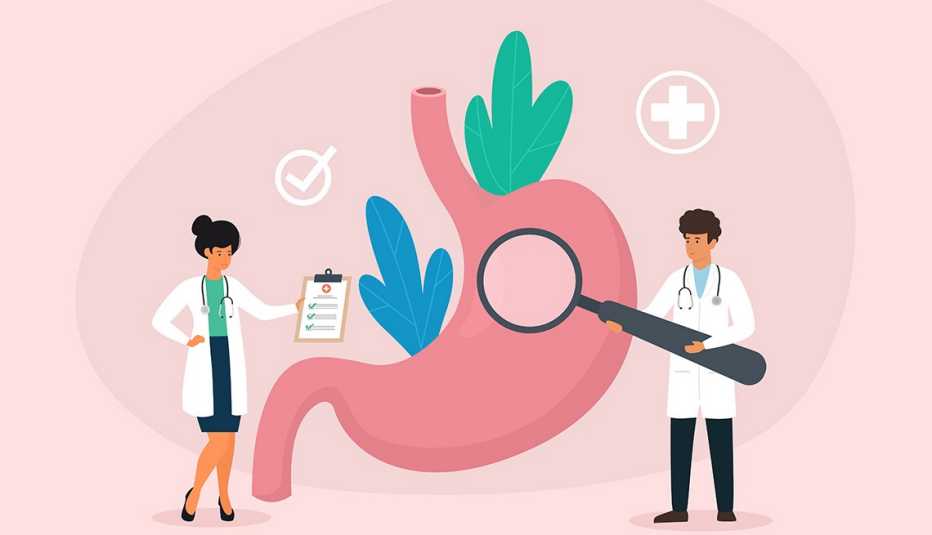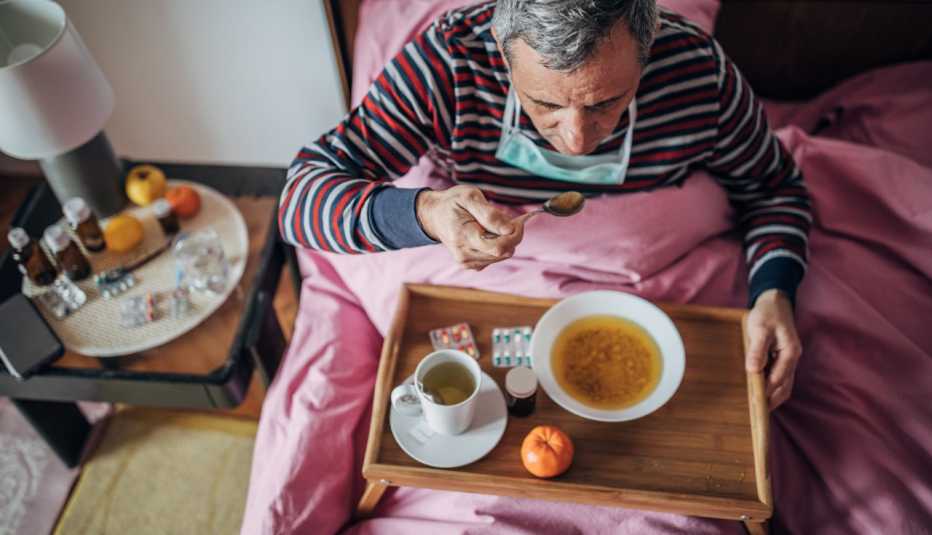8. Everyone should take a daily multivitamin
What science shows: A 2022 review of 84 studies by the U.S. Preventive Services Task Force found no convincing evidence that multivitamins have any benefit for nonpregnant adults. “You’ll get much more bang for your buck if you eat a healthful diet with plenty of fruits and different vegetables,” says Linder.
9. We eat eight spiders a year in our sleep
What science shows: If you were a nighttime mouth breather as a child, you probably heard one old wives’ tale that was enough to scare you into becoming a nasal breather: Humans swallow an average of eight spiders while sleeping each year. Yikes!
Fortunately, this is not likely for several reasons. “Spiders like to stay in their webs and, unless they view you as prey, aren’t going to crawl into bed,” says Joe Alton, author of The Survival Medicine Handbook: The Essential Guide for When Help Is Not on the Way. “That would have to be a pretty big spider,” he adds. If you have bedbugs, spiders might come down to your bed to chomp on those, getting near you in the process, but if that’s the case, Alton says you have bigger problems than the possibility of swallowing a spider!
Next, even when asleep, our bodies produce noise or vibrations that spiders don’t like. “Things like a beating heart, breathing or snoring all cause a spider’s spidey sense to say, ‘Stay away!’ ” explains Alton. And lastly, our lips contain sensory nerve fibers, so it’s unlikely we wouldn’t feel a spider crawling on them in the night, even if we’re deep sleepers.
The bottom line? “Swallowing a spider would be a very, very rare event, not something that occurs as often as eight times a year — and probably not eight times in a lifetime,” Alton confirms, reassuringly.
10. If swallowed, gum takes seven years to digest
What science shows: Most of us don’t make a habit of swallowing gum, but every now and then, it can happen. We grew up hearing that if you ingest gum, your body basically can’t digest it. So, if you accidentally swallow some gum, is it true that your digestive system will take a hit? Fortunately, no. “It is certainly not true that gum takes years to pass through the stomach,” says Andrew Boxer, a gastroenterologist with Gastroenterology Associates of New Jersey.
It is true, however, that we do not actually digest gum, although it typically passes through the digestive tract in a matter of hours to days. “Very rarely patients can form a bezoar [an indigestible conglomerate trapped in the gastrointestinal tract], which can stay in the digestive system, typically the stomach, for a long time,” adds Boxer. A bezoar can be made of hair, vegetable matter or other substances, including gum. But for this to happen, Boxer notes, someone would typically need to have an underlying disorder and swallow a massive amount of gum.
11. Cranberry juice cures urinary tract infections
What science shows: Chugging cranberry juice won’t help if you have a bladder infection, says Pamela Levin, associate professor of urogynecology at the University of Pennsylvania. “If you have symptoms such as burning while urinating, you typically need antibiotics and care from your doctor,” she says. “[Cranberries] are linked to preventing, not treating, infections.”
12. Avoid exercise if you’re unwell
What science shows: Studies have found that mild to moderate exercise when you have an upper-respiratory infection may help you feel better faster. Lying in bed can weaken your muscles and predispose you to pneumonia, says William Schaffner, an infectious disease expert at the Vanderbilt University School of Medicine. Light exercise prompts you to breathe deeply and cough, which “gets things up.”
13. You must wait an hour after eating before swimming
What science shows: “It is a myth that you need to wait to swim after eating,” says Boxer. The thought here was that when you eat, blood flow is diverted to your digestive system, and this interferes with blood flow to the muscles. “While this is true, it is insignificant to inhibit any necessary blood flow for muscles to swim,” Boxer adds. Some people are a bit more tired while digesting or might have some abdominal cramping, but this is not dangerous enough to affect swimming.
In a review published in 2011, the American Red Cross Scientific Advisory Committee weighed in: “No reported cases of eating before swimming causing or contributing to fatal or non-fatal drowning are reported in any of the literature searched.” They concluded that “currently available information suggests that eating before swimming is not a contributing risk for drowning and can be dismissed as a myth.”
Still, you may want to avoid swimming after eating a huge meal, as you’ll probably feel tired, bloated and unmotivated to swim. Boxer suggests avoiding large, heavy, greasy meals and meals that are hard to digest or have high sugar loads before getting in the pool.
14. You need 10,000 steps a day to boost your longevity
What science shows: The latest research shows that as few as 6,000 steps a day can do it. One 2022 study found that adults 60 and older who clocked 6,000 to 8,000 steps daily had a 50 to 60 percent lower chance of early death.
15. Running will damage your knees
What science shows: Studies in recent years reveal that running does not raise your risk of knee problems. In fact, pounding the pavement seems to protect your joints. One large study found that runners were half as likely to develop knee osteoarthritis compared with non-runners. Runners typically have stronger quadriceps muscles, which helps to protect the joint, explains Grace Lo, a researcher at Baylor University College of Medicine.
16. Rest when you have back pain
What science shows: While it’s fine to rest for a day or two after a back flare-up, studies over three decades show that you will recover faster if you remain active, says James Powers, an internal medicine geriatric physician at Vanderbilt University Medical Center. Prolonged bed rest makes most types of back pain worse. “The more you don’t use your muscles, the stiffer you will get,” he says.
17. Joints ache when the weather is about to change
What science shows: Do your joints ache or do you experience muscle stiffness when it gets cold? Although some call this an old wives’ tale, others are quick to deem it legitimate. A survey of 200 participants with knee osteoarthritis found that changes in barometric pressure and ambient temperature made their knee pain worse, while other studies have found no association between rainy days and knee or back pain.
The jury is still out on this one, but experts can’t deny that when it comes to joints aching when the weather cools down, patient experience tends to agree. “We all know that our joints feel worse when there is a low-pressure system coming in, which is why people say they know when the weather is changing,” Luks explains. “Interestingly, research into this topic claims that there is no association between weather and joint pain, but my joints don’t agree with that.”
Linder confirms that this is something he frequently hears as well. “There’s no denying that people when the weather changes say that their joints ache more,” he says. “And that’s been described over and over and over again, so there’s no denying people’s experiences.”
18. If it’s an actual heart attack, you will have chest pain
What science shows: About 42 percent of women and 31 percent of men don’t have chest pain during a heart attack, according to a study published in JAMA. Other symptoms include shortness of breath, light-headedness, nausea and pain or discomfort in the back, neck, jaw, or one or both arms.
19. Air hand dryers are more hygienic than paper towels
What science shows: They may save trees, but air hand dryers in public restrooms don’t remove germs as well as paper towels, according to research. Even worse, they may spread germs around. One study published in the Journal of Hospital Infection found that airborne bacteria counts were 27 times higher when jet air dryers were used.
Editor's note: This article, originally published Jan. 18, 2023, has been updated to reflect new information.










































































